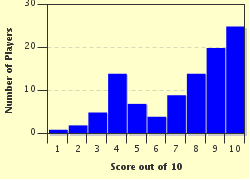Quiz Answer Key and Fun Facts
1. "When Adam delved and Eve span who was then the gentleman?" is a saying from Mediaeval England. What does the word "delved" mean in this context?
2. "When Adam delved and Eve span who was then the gentleman?" is a phrase from Mediaeval England. What does the word "span" mean in this context?
3. In what upheaval was the phrase "When Adam delved and Eve span who was then the gentleman?" first used?
4. Who is credited with coining the saying "When Adam delved and Eve span, who was then the gentleman"?
5. John Ball was not the only leader. Jack Straw and another man came to the fore. What was his name?
6. Who was the king of England during the English Peasants' Revolt?
7. Name the major tax which incensed the peasants and was a major cause of the revolt?
8. What famous London landmark was taken by Wat Tyler and the peasants in June of 1381?
9. On June 15, Wat Tyler met Richard II and rode right up to the young king. The nearness of Tyler to the monarch apparently made the Lord Mayor of London lose his temper. According to one source the mayor knocked Wat Tyler from his horse with a broadsword and as Tyler lay on the ground one of the king's squires stabbed him in the stomach, killing him. After Wat Tyler was killed, where was his head displayed as a warning to all?
10. The core demands in the Peasants' Charter presented to Richard II amounted to what?
Source: Author
TimTamMan
This quiz was reviewed by FunTrivia editor
bloomsby before going online.
Any errors found in FunTrivia content are routinely corrected through our feedback system.

